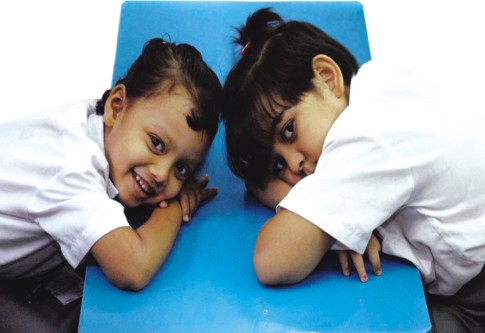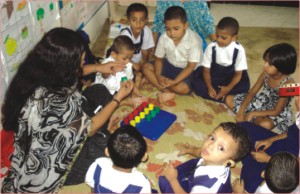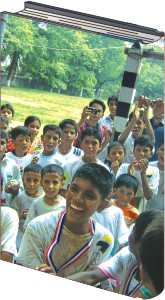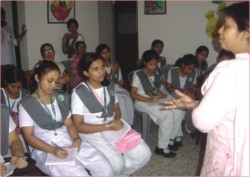| Spotlight
Education without Border
Tanzina Rahman

Pen, paper, textbooks and a chalkboard, these are traditional stuff one needs to attend a class. That is if you were living in the 90s! Today the notion of education and academic curriculum has changed dramatically. Not only we are relying on the traditional context but we are also largely driven by the power of ICT. The definition of good education includes academic, social, cultural and Internet based learning. Hence, to keep pace with the competitive world, education needs to be without barrier and without border.
When the students heard about the environment conservation programme that their five schools were organizing, it was just the beginning of the hard work they were about to put in to bring a change in their community. More than 12,000 students from Dr. Khastagir Govt. Girls High School, Chittagong Govt. High School, B. M. S Girls' High School, Chittagong Cantonment Public College and Ispahani Public School and College were determined to create awareness about keeping their classrooms and the area around their school compounds clean. Colourful posters, each carrying slogans to stop pollution and littering and preserve the environment, were displayed across the walls of their classrooms. The students also planted trees in their school gardens and placed dustbins in the halls.
This project was part of the British Council's Connecting Classrooms programme and the initiative was actually a joint effort between UK schools and schools in Bangladesh. The schools in Chittagong are all working in partnership with schools from Perth in Scotland. Environment conservation was something that the schools from both Scotland and Bangladesh could relate to. In this particular project, which was titled as Perth and Chittagong- Realising Our Potential Together, the three schools in Perth showcased a similar initiative by bringing up issues on climate change, endangered species and natural disasters. Pupils displayed evidence of their research in their schools to inform others and assemblies were undertaken to inform the wider audience in their community. Perhaps more importantly they also shared this information with their partner schools, so the students could see that this was a challenge that was affecting both Scotland and Bangladesh.
"By working under this theme the students are becoming aware of the global issues and getting a platform to enhance their skills," said Shahnaz Shahid, teacher of Dr. Khastagir Govt. Girls' High School.
 For the last two years, Connecting Classrooms has been supporting a range of international school projects between schools from across Bangladesh and the UK. The schools wishing to participate in the programme were organised into clusters of five by their local District Education Office. Three representatives of each cluster then attended a Contact Seminar in the UK where they were able to meet representatives from UK clusters who wanted to work with Bangladeshi schools. Once the partnership has been formed the schools then work together to design an international curriculum project. The British Council provides the partnership with a grant to support the projects, and organise exchange visits, professional development programmes and intercultural exchanges. The projects all serve to strengthen intercultural dialogue between the partnered schools and to enable the students to develop international skills and experience. For the last two years, Connecting Classrooms has been supporting a range of international school projects between schools from across Bangladesh and the UK. The schools wishing to participate in the programme were organised into clusters of five by their local District Education Office. Three representatives of each cluster then attended a Contact Seminar in the UK where they were able to meet representatives from UK clusters who wanted to work with Bangladeshi schools. Once the partnership has been formed the schools then work together to design an international curriculum project. The British Council provides the partnership with a grant to support the projects, and organise exchange visits, professional development programmes and intercultural exchanges. The projects all serve to strengthen intercultural dialogue between the partnered schools and to enable the students to develop international skills and experience.
The schools that wanted to link with Bangladesh are from across the UK . Some are from communities with having little idea about Bangladesh and others from areas with large number of Bangladeshi students. Annette Carlton, the cluster co-ordinator from Redbridge in London, who has a partnership with Pabna recently led a group of teachers to Pabna.
"I wanted to participate in this programme because there are a high number of Bangladeshi families who have settled in the London Borough of Redbridge. Through analysis of examination results, rates of progress, expected and actual outcomes it has become increasingly evident that our Bangladeshi children tend to be our lower achievers. During the weeks before the visit, teachers told me that great excitement was shown by their Bangladeshi pupils. Children who were normally reserved or unwilling to participate in class were suddenly transformed by the knowledge that their teacher was paying a visit to their country. They felt important and valued so impact was evident even before the visit. I would like the Bangladeshi community to become more involved in their children's education schools are planning a Bangladeshi day, themed assemblies, mothers are being invited into school to read Bangladeshi poetry, stories, cook typical dishes, lead on art projects, play music etc. The teachers who visited Pabna are busily making presentations to their colleagues, head teachers and governors and meetings are taking place to consider next steps,"Annette said.
In Bangladesh, Connecting Classrooms has brought government, non government and Madrasha schools together for the first time. All of the clusters are made up of schools that are close together but would not normally have the chance to work together. Clusters in the UK are also engaging students from different types of schools with a shared interest of having international education and developing the skills among the pupils.
 Connecting Classrooms works in partnership with the Minsitry of Education and is working across Bangaldesh. There are now eighteen partnerships between Bangladeshi and UK clusters of schools. A total of 90 schools from across all six divisions and 60 schools from England, Scotland and Wales are involved. Connecting Classrooms works in partnership with the Minsitry of Education and is working across Bangaldesh. There are now eighteen partnerships between Bangladeshi and UK clusters of schools. A total of 90 schools from across all six divisions and 60 schools from England, Scotland and Wales are involved.
"The unique aspect of Connecting Classrooms is that it builds lasting partnerships between schools here and in the UK and allows students to be directly involved in their own projects. Unlike other programmes that are conducted in the education sector which focus on professional development for teachers and head teachers or reforming the academic or management system, this particular programme has been successful because it involves young minds," explained Miron Kumar Bhowmik, Head of Schools and Sport, British Council.
"I have visited the cluster schools recently, and the response of the students who are involved in Connecting Classrooms activities was overwhelming," he added.
Activities under Connecting Classrooms project are divided into five major components- international curriculum projects which allow students to get acquainted with their partner schools and engage students in international projects, Social Action Projects which encourage students to get involved in the community and state their concern about global issues. There are also professional development programmes for teachers and Head teachers and policy level discussions that support the schools in their international work.
As part of their Social Action Project, Barisal schools developed workshops and seminars in line with their theme- Celebrating Cultural Diversity with a particular focus on pollution and the environment, to raise awareness among the students about environmental issues. Followed by the workshop an eco team was formed in all the schools to keep the school environment clean and make other students aware about the 4 R' - Replace; Reuse; Reduce; Recycle. There will be an information exchange workshop in the UK schools in the future where students will gain hands on experience and learn new ideas for waste management and recycling.
Teachers from Barisal and Swansea in Wales have visted each others' schools as part of their international curriculum project. This provided the opportunity for face-to-face planning and communication. Swansea teachers taught science and geography lessons to Barisal students, with Barisal teachers observing. Teachers from both countries discussed different teaching methodologies, techniques and resources. The visit has helped to raise awareness and improve knowledge and understanding of both education systems..
The students from Barisal also conducted an exciting activity whereby a box filled with goodies was posted to their partner schools to display the culture and heritage of Bangladesh. A similar box was also posted from Swansea as part of their "Cultural Diversity in a Box" activity. The result was indeed outstanding. Students from both Wales and Bangladesh stated that they had a comprehensive exposure about the other country and an increased appreciation of the differences and similarities between the two cultures.
 Meanwhile in Jessore, students from Nengurahat Fazil(B.A) Madrasha, Mashimnagor High school, Govt. Girls' High School, Jessore Zilla School and Sheva Songo Girls High School showcased innovative ideas through projects concerning issues associated with flooding. They came up with new flood control measures and enhanced their English skills through corresponding with students in their partner schools in Blackburn in the north of England. One of the aims of the project was to build long lasting links between the communities and to contribute to the development of a productive and sustainable future. Meanwhile in Jessore, students from Nengurahat Fazil(B.A) Madrasha, Mashimnagor High school, Govt. Girls' High School, Jessore Zilla School and Sheva Songo Girls High School showcased innovative ideas through projects concerning issues associated with flooding. They came up with new flood control measures and enhanced their English skills through corresponding with students in their partner schools in Blackburn in the north of England. One of the aims of the project was to build long lasting links between the communities and to contribute to the development of a productive and sustainable future.
Many of the clusters use the international partnership to explore and celebrate aspects of their own culture and heritage. In Dhaka, Viqarunnisa Noon School and College, Willes Little Flower School and College, Govt. Laboratory School and College, Agrani School and College and Udayan Uchcha Madhyamik Bidyalaya worked together to produce power point presentations that introduced their schools and traditional cultural aspects from Bangladesh to their partner schools. Their project then went on to explore and examine preconceptions of the partners' lives and environments and to broaden and deepen mutual understanding and perceptions.
 Maple Leaf, St. Joseph and Summerfield schools participated in Social Action Project with their UK partners that increased awareness of common challenges to the two communities. Their projects enabled young people from both countries to explore the ways in which they can make a positive impact on their local communities. According to the students who took part in the programme, the Connecting Classrooms projects allowed them to gain an understanding that they share many common issues and that they can work collaboratively to make a difference in their respective communities. The students from Maple Leaf visited local charitable organisations and institutions that support people with disabilities (PWD) to gain an in depth insight into the disability situation existing in Bangladesh. The aim of this activity was to create awareness of the challenges that people with disabilities can face in Bangladesh and the UK. Upon completion of the visits, students organized short awareness campaigns sharing what they had learned with other students, teachers, parents and general visitors. In addition, the students also reinforced the message that young people have the capability to develop a better, more inclusive future for everyone. Maple Leaf, St. Joseph and Summerfield schools participated in Social Action Project with their UK partners that increased awareness of common challenges to the two communities. Their projects enabled young people from both countries to explore the ways in which they can make a positive impact on their local communities. According to the students who took part in the programme, the Connecting Classrooms projects allowed them to gain an understanding that they share many common issues and that they can work collaboratively to make a difference in their respective communities. The students from Maple Leaf visited local charitable organisations and institutions that support people with disabilities (PWD) to gain an in depth insight into the disability situation existing in Bangladesh. The aim of this activity was to create awareness of the challenges that people with disabilities can face in Bangladesh and the UK. Upon completion of the visits, students organized short awareness campaigns sharing what they had learned with other students, teachers, parents and general visitors. In addition, the students also reinforced the message that young people have the capability to develop a better, more inclusive future for everyone.
Looking to the future Mr Bhowmik said "Our next plan is to create Connecting Classrooms Online, where a further 200 Bangladeshi schools will participate in a web-based projects with UK schools,". These kind of school projects and international partnerships are really helping Bangladeshi students and their UK counterparts to develop a more global outlook.
|

